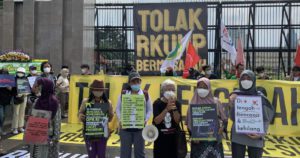In late 2022, Europe’s high energy prices are making it more difficult to fight against low temperatures. Countries are on the hunt for viable alternatives, as the price of natural gas rises and Russia cuts its supply. According to Emmanuel Macron, the solution might be hiding in nuclear energy.
France has been involved in the nuclear industry since the 1970s, when the oil shock inspired a switch to other energy sources. The country had acquired experience in the field with the production of the atomic bomb, and nuclear submarines. They built on that with highly educated engineers and a centralized political system, which allowed the plan to go through with little intervention from the public.
Today, France has an arsenal of 56 nuclear reactors which are responsible for approximately 70% of its electricity-generating capacity. French residents emit on average only 4.5 tonnes of carbon dioxide a year, due to their significant reliance on an energy source with a low carbon footprint. To put this into perspective, on average, German residents emit 7.9 tonnes, and residents in the United States, 14.7 tonnes.
However, 26 out of these 56 reactors are dysfunctional at the time of writing. A year ago, the state-controlled operator of the reactors, EDF, shut down 19 of them due to corrosion cracks and other technical defects. Therefore, the capacity of nuclear power has been severely limited. As a result, the potential output has decreased over the past months.
In the coming months, the French nuclear output will decrease to 45 gigawatts. This will exacerbate the situation caused by higher gas prices following the war, and will possibly result in mass energy shortages in France and neighboring countries. This was foreshadowed on the 13th of December, when an energy demand spike caused France to decrease exports of energy to the United Kingdom – halving the expected amount.
According to the EDF, the chain of nuclear reactor closures has sentenced the French energy industry to two years of low output. This will subsequently decrease French exports of energy to neighboring countries, implying a potential economic downturn. European Commission President, Ursula von der Leyen has issued a warning to the European Union, communicating a possible gas shortage in 2023, if Russia further decreases the supply of gas.
The energy roadmap constructed by the French government was initially supposed to turn away from nuclear energy and shut down another 12 reactors by 2035. However, this changed in 2022 with the start of the war in Ukraine. Following the increase in the price of natural gas, Emmanuel Macron announced a return to this energy source. He pledged to build at least 6 new reactors, and that the number could reach 14 if all went according to plan. Similarly, the EDF stated it would get most of the existing reactors operational by January 2023.
EDF has faced challenges when planning this return to nuclear power. The company currently finds itself in debt of 90 billion euros, and it is expected that a 42 billion euro loss for the year will be added. The French government is planning to complete the takeover of the entire company, already owning 84%. The remaining 16% is valued at $10.3 billion. The purchase would see the company become fully government-controlled.
In order for the planned projects to take place, both the EDF and the rest of the industry need to increase their labor supplies on the projects. The company needs to recruit around 3,000 workers a year over the next seven years, to be on track for building at least six new generation reactors. The industry as a whole will need 10,000 to 15,000 workers a year for the same period. In order to increase the supply of skilled labor, the EDF is setting up a new school to train welders, pipe-fitters and boilermakers.
All in all, it remains to see whether France can successfully achieve their goals of transitioning to even heavier reliance on nuclear power; and whether other countries follow suit, inspired by the green effects of this virtually untapped energy source.







